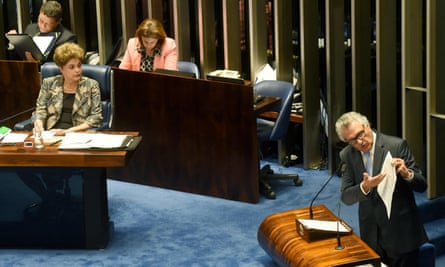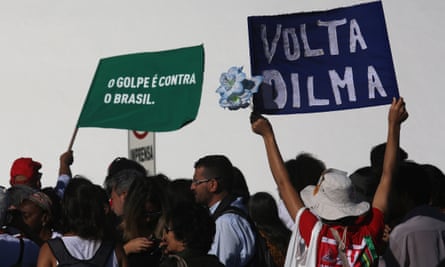Brazil’s first female president, Dilma Rousseff, put up a fight in keeping with her Marxist guerrilla background on Monday with a powerful denunciation of the politicians who are poised to eject her from power within days.
Testifying in her own defence before a predominantly opposition senate, the Workers’ party leader said she had withstood torture in her fight for democracy and would not back down even though she is widely expected to lose a final impeachment vote likely to occur within the next two days.
“I fought against dictatorship. I have the mark of torture on my body,” she reminded senators of the abuse she suffered during imprisonment by the military government. “At almost 70 years of age, it’s not going to be now, after becoming a mother and grandmother, that I will abandon the principles that have always guided me.”
Her comparison with the military tribunals that condemned her to prison more than 40 years ago was in keeping with the suspended president’s consistent claim throughout the nearly 10-month impeachment debate that she is the victim of a coup.
Opponents, however, used the question-and-answer session to assert their claim that Rousseff is undergoing a constitutionally approved trial overseen by the supreme court to assess whether she committed a “crime of responsibility” by putty-filling government accounts ahead of the last election.
Now nearing its end, the protracted political trial has paralysed government, overshadowed the buildup to the Olympics, and undermined efforts to reverse the alarming decline of Latin America’s biggest economy.
Although many Brazilians are tired of the squabbles in Brasília, historians are likely to look back on today’s session in the senate as a key moment in the ousting of the Workers’ party, which is about to be thrown out of power despite never losing a presidential election since 2002.
As the president’s motorcade left the Palácio da Alvorada in the morning, several hundred supporters lined the roads bearing banners condemning the illegality of impeachment. As Rousseff entered the legislative building, allies chanted: “Olê, Olê, Olê, Olá, Dilma Dilma.”

The floor had been packed for the arrival of Rousseff, but there were just as many eyes on her invited guests who showed their support by filling out the media gallery. Among them was former president Luiz Inácio Lula da Silva, who barely changed his steely forward-facing stare throughout the speech. He sat beside musical legend Chico Buarque – a prominent critic of impeachment – who caused a commotion when he arrived as senators and staff flurried to take photos.
Rousseff followed soon after with little ceremony and, as the hearing began, a hush descended on the chamber that was broken only by the chatter of camera shutters as the president waved and smiled from the bench while she was introduced by the chief justice of the supreme court, Ricardo Lewandowski, who is presiding over the trial in the senate.
In her 40-minute statement, Rousseff serenely proclaimed her innocence and struck a tone which oscillated between that of a defiant warrior defending social rights and a victimised woman wronged by her usurpers.
She reminded senators that during the inauguration of her second term in January 2015, she had promised to respect the constitution, observe the laws and carry out a mandate given to her by 54 million voters – a majority. But she also acknowledged that she had her flaws and that her government had been hurt by economic crises and political instability worsened by her opponents.
Later, for perhaps the first time in this process, Rousseff appeared to choke up as she recounted Workers’ party achievements – the expansion of welfare payments, increased access to higher education, a rise in the minimum wage, development of offshore oilfields and the hosting of the World Cup and the Olympics. It was unclear whether this pause was from emotion or fatigue, but supporters cheered their encouragement as she paused to sip water.
“No demonstrations please,” came a reprimand from the public address system, in a tone more respectful than earlier episodes in the impeachment process.
The anti-Rousseff camp in the senate was keen to avoid the boisterously triumphant scenes witnessed when the lower house voted for impeachment in April, and to minimise the impression that the country’s first female president is a victim.

But that will be hard to do, as Rousseff has lived in the shadow of an impeachment threat for more than a year.
Monday’s debate also set the stage for the next presidential election in 2018. As the president spoke, her predecessor and mentor Lula – who faces a criminal trial for corruption and obstruction of justice – looked pensive. Like Rousseff, he denies the charges against him, which he believes have been trumped up by political enemies to prevent him from running again. But the Workers’ party will try to rally around the sense of injustice many feel about the forced demise of its leaders.
Rousseff may be wounded, perhaps beyond recovery, but she used her speech to maul some of those who brought her down.
“Everybody knows this impeachment process opened with explicit blackmail by the former head of the lower house, Eduardo Cunha,” she said, noting that her accusers are themselves accused of more serious crimes.

Although she did not mention the interim president, Michel Temer, by name, she implicitly condemned her former running mate as a “usurper” who stole her office in a “coup” that bypassed direct elections. “As is typical of authoritarian elites, they do not see the will of the people as the source of legitimacy. They want power at any price,” she said.
There were broadsides too for Temer’s appointment of an all-male, all white cabinet, despite the fact that the electorate had chosen a woman to lead them.
As the president concluded her speech with a call for senators to vote against impeachment and for democracy, supporters on the floor briefly erupted in applause and cheers of “Dilma, guerreira do povo brasileiro”, (“Dilma, the warrior of the Brazilian people”), while her opponents sat in silence.
A question-and-answer session followed. The first to have five minutes at the microphone was the former agriculture minister Kátia Abreu – a loyal supporter – who expressed her conviction that Rousseff was innocent and wrongly accused. Humberto Costa, the leader of the Workers’ party in the upper house, said he hoped this would be remembered as a “day of redemption”.
But the vast majority of those who posed questions or made statements were critical of Rousseff’s leadership and said she was being removed as a result of due constitutional process.
“This isn’t a coup, it’s democracy in evolution,” claimed Senator José Medeiros, who blamed the current turmoil in Brazil on Rousseff’s government. “You call this process a coup? The supreme court presides over this session. Is the chief justice a coup-monger?” asked Ricardo Ferraço of the Social Democratic party of Brazil.
Rousseff is being impeached for window-dressing government accounts ahead of the last election, by issuing decrees on spending without congressional approval and waiting several months to reimburse a state-owned bank for a low-interest financing scheme for family farmers.
Senators have to judge whether this is a “crime of responsibility” that merits removal from office.

But Rousseff’s lawyers argue the charge is more political than legal. Similar fiscal irregularities went unpunished in previous national and regional administrations, but these were being used as a pretext to remove a leader who had struggled to assert her authority. Prominent senators – close to Temer – have also been secretly recorded plotting to remove Rousseff in the hope that it will kill off a wide-ranging corruption investigation – known as Lava Jato (Car Wash) – that has implicated many of them in a kickback scheme involving the state-run oil company Petrobras.
Allies said there was little chance the president would survive the final impeachment vote.
At the start of the senate process in May, opponents had already secured more than the two-thirds of the 81 votes they will need to remove the president from office. There has been no evident progress in changing minds since then.
Senator Otto Alencar, of the Social Democratic party (PSD) from the north-eastern state of Bahia, revealed he would vote against the president’s impeachment but said few would be swayed by Rousseff’s speech.
“There’s no crime of responsibility. If she’s ousted, she’ll be ousted for political and administrative errors. She’s an honest woman.” he said. “I don’t think anyone will change their minds – I’ll vote with Dilma but I think my vote will be a vote for a lost cause.”

Comments (…)
Sign in or create your Guardian account to join the discussion